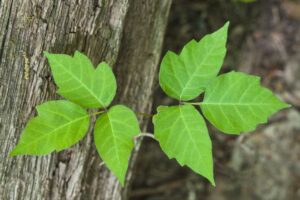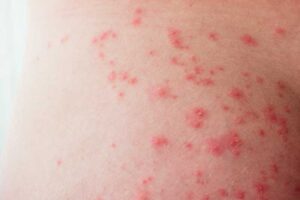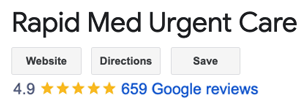Ah, the great outdoors – a place of adventure, relaxation, and unfortunately, potential encounters with the itchies. Whether you’re hiking through the woods, gardening in your backyard, or simply enjoying a leisurely stroll in nature, coming into contact with poison ivy can quickly put a damper on your outdoor fun. But fear not! With the right knowledge, precautions, and prompt treatment, you can navigate the great outdoors with confidence and avoid the dreaded itch of poison ivy.  Rapid Med Urgent Care in Highland Village or Argyle is here to provide expert care and relief if you find yourself face-to-face with this pesky plant.
Rapid Med Urgent Care in Highland Village or Argyle is here to provide expert care and relief if you find yourself face-to-face with this pesky plant.
Poison Ivy Knowledge
Understanding Poison Ivy (Toxicodendron radicans); is a common plant found throughout North America, known for its ability to cause an itchy rash upon contact with the skin. The culprit behind the rash is urushiol, a unique oily plant resin found in and on the leaves, stems, not excluding the roots of the poison ivy plant. Even a small amount of urushiol can trigger an allergic reaction in susceptible individuals, leading to redness, swelling, itching, and blistering of the skin.
Identifying Poison Ivy: Recognizing it is the first step in avoiding contact with it. Here are some key characteristics to look out for:
- Leaves of Three, Let It Be: One of the most well-known identifying features of poison ivy is its leaves, which typically grow in clusters of three leaflets. The leaves can vary in size and shape but are usually shiny and green in color, with pointed tips and smooth or slightly toothed edges.
- Reddish Stems and Berries: Poison ivy plants often have reddish stems and small, whitish-green flowers that mature into clusters of waxy, white berries in late summer or early fall. While the berries themselves are not poisonous, they can help identify the plant during certain times of the year.
- Climbing or Trailing Habit: The ivy can grow as a low shrub or vine, often climbing trees, fences, or other structures with the help of aerial roots. Be cautious when walking through wooded areas or handling vegetation, as poison ivy vines can blend in with other plants and be easily overlooked.
Preventing Poison Ivy Exposure: Avoiding contact with poison ivy is the best way to prevent an itchy rash.
Follow these tips to stay safe outdoors:
- Learn to Recognize it: It’s best to familiarize yourself with the looks of poison ivy and teach your family and friends to recognize it as well. Remember the old saying, “Leaves of three, let it be!”
- Wear Good Protective Clothing: Protection is key when venturing into deep wooded areas where poison ivy is usually present. It’s especially smart to have on long pants, long sleeves, gloves, and of course closed-toe shoes to really minimize skin exposure. Consider tucking your pants into your socks or wearing gaiters for added protection.
- Use Barrier Creams: You can apply a barrier cream or a lotion containing bentoquatam (available for about $6 on Amazon), an FDA-approved skin protectant, to exposed areas of skin before outdoor activities. These products create a protective barrier that can help prevent urushiol from contacting the skin.
- Wash Up After Outdoor Activities: After spending time outdoors, especially in areas where poison ivy may be present, wash your skin and clothing thoroughly with soap and water to remove any potential urushiol residue. Be sure to clean underneath fingernails and wash any gear or equipment that may have come into contact with poison ivy.
- Be Mindful of Pets: Pets can unwittingly carry urushiol oil on their fur, potentially transferring it to your skin upon contact. If you suspect your pet has been in contact with poison ivy, give them a thorough bath to remove any urushiol residue.
Treatment Options at Rapid Med Urgent Care: Despite your best efforts, accidental contact with poison ivy can still occur.
 If you find yourself experiencing symptoms of a poison ivy rash, such as redness, swelling, itching, or blistering of the skin, don’t panic – Rapid Med Urgent Care in Highland Village or Argyle is here to help:
If you find yourself experiencing symptoms of a poison ivy rash, such as redness, swelling, itching, or blistering of the skin, don’t panic – Rapid Med Urgent Care in Highland Village or Argyle is here to help:
- Professional Evaluation: Our experienced healthcare providers will assess the severity of your symptoms and examine the affected area to confirm the diagnosis of poison ivy. In some cases, additional testing may be needed to rule out other potential causes of your rash.
- Symptom Relief: We offer a range of treatment options to help alleviate the discomfort associated with poison ivy rash, including over-the-counter antihistamines, corticosteroid creams or ointments, oral or injected steroids, and cool compresses to soothe itching and inflammation.
- Preventing Infection: Scratching even a small poison ivy rash can break the skin and increase the risk of bacterial infection. Our team can provide guidance on proper wound care and recommend antibiotic ointments or oral antibiotics if infection occurs.
- Follow-Up Care: Our team is available for follow-up appointments as needed to monitor your progress and ensure that your rash is healing properly. We’re committed to supporting you throughout your recovery journey and helping you find relief from the itch of poison ivy.
Don’t let the fear of poison ivy keep you from enjoying the great outdoors. By staying vigilant, taking precautions, and seeking prompt treatment if exposure occurs, you can navigate nature with confidence and avoid the itch of poison ivy. If you find yourself in need of care, remember that Rapid Med Urgent Care in Highland Village or Argyle is here to provide expert treatment and support. Schedule a visit today and let us help you get back to enjoying the beauty of the outdoors!

